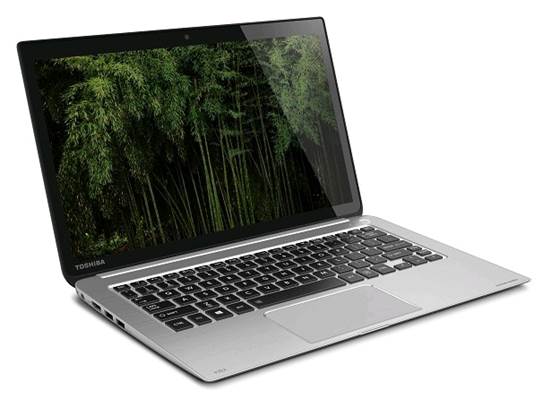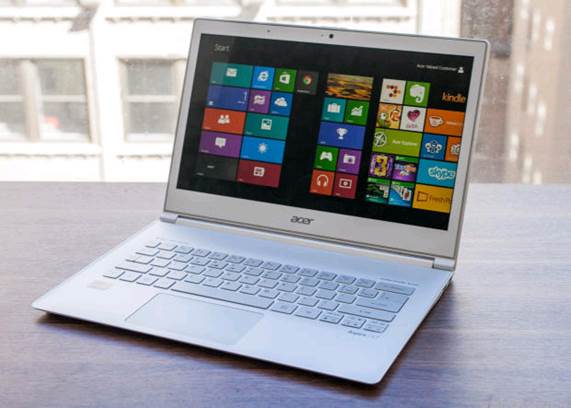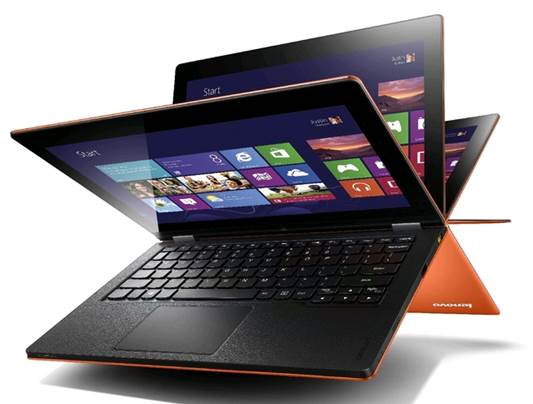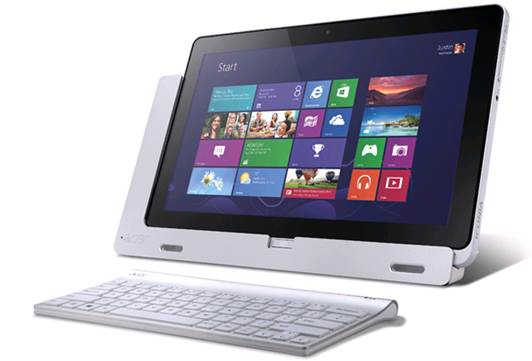Performance and Battery Life
Asus
Transformer Book (Core i7-3517U 1.9GHz, Intel HD 4000)
·
PCMark 7: 4,414
·
3DMark06: 3,840
·
3DMark11: E924/P512/X177
·
ATTO (top disk speeds): 482MB/s (read); 317MB/s (write)

Asus
Transformer Book
Toshiba
Kirabook (Core i7-3537U 2.0GHz, Intel HD 4000)
·
PCMark7: 5,275
·
3DMark06: 5,272
·
3DMark11: N/A
·
ATTO (top disk speeds): 553MB/s (read); 500MB/s
(write)

Toshiba
Kirabook
Acer
Aspire S7 (Core i7-3517U 1.9GHz, Intel HD 4000)
·
PCMark7: 5,011
·
3DMark06: 4,918
·
3DMark11: E1035/P620/X208
·
ATTO (top disk speeds): 934MB/s (read); 686MB/s
(write)

Acer
Aspire S7
MSI
Slidebook S20 (Core i5-3337U 1.8GHz, Intel HD 4000)
·
PCMark7: 4,043
·
3DMark06: 3,944
·
3DMark11: E1053/P578
·
ATTO (top disk speeds): 484MB/s (read); 286MB/s
(write)
.
MSI
Slidebook S20
Asus
Taichi 21 (Core i7-3517U 1.9GHz, Intel HD 4000)
·
PCMark7: 4,998
·
3DMark06: 4,818
·
3DMark11: E1137/P610/X201
·
ATTO (top disk speeds): 516MB/s (read); 431MB/s
(write)

Asus
Taichi 21
Microsoft
Surface Pro (Core i5-3317U 1.7GHz, Intel HD 4000)
·
PCMark7: 4,673
·
3DMark06: 3,811
·
3DMark11: E1019/P552
·
ATTO (top disk speeds): 526MB/s (read); 201MB/s
(write)

Microsoft
Surface Pro
Lenovo
IdeaPad Yoga 13 (Core i5-3317U 1.7GHz, Intel HD 4000)
·
PCMark7: 4,422
·
3DMark06: 4,415
·
3DMark11: E917/P572
·
ATTO (top disk speeds): 278MB/s (read); 263MB/s
(write)

Lenovo
IdeaPad Yoga 13
Acer
Iconia W700 (Core i5-3317U 1.7GHz, Intel HD 4000)
·
PCMark7: 4,580
·
3DMark06: 3,548
·
3DMark11: E518/P506
·
ATTO (top disk speeds): 542MB/s (read); 524MB/s
(write)

Acer
Iconia W700
Dell
XPS 12 (Core i5-3317U 1.7GHz, Intel HD 4000)
·
PCMark7: 4,673
·
3DMark06: 4,520
·
3DMark11: N/A
·
ATTO (top disk speeds): 516MB/s (read); 263MB/s
(write)

Dell
XPS 12
The Transformer Book runs off a 1.9GHz Core
i7-3517U processor, the same one used in various Ultrabooks that went on sale
last fall, like the Acer's Aspire S7 and the Asus' Taichi 21. In addition, it
has 4GB RAM, 128GB SanDisk SSD drive, and of course, Intel HD Graphics 4000
integrated. That is, we don't believe it is a slow computer. In fact, it boots
in 6 seconds, probably the fastest boot time we ever recorded on a Windows 8
PC. It also resumes from sleep mode in less than 2 seconds, as advertised. What
we're trying to say is: calling this a slow system would be a huge mistake.
If you are thinking its 500GB hard drive
will reduce the performance scores, please rest assured that it is not true.
First of all, we have similar scores even when running the tests with the
keyboard removed. Second, Asus said the operating system is installed on the
128GB solid-state drive and that the computer stores files there first by
default, unless you tell it to do otherwise. In other words, you will not start
using it until you run out of space on the SSD. It's really easy to think about
the keyboard dock as one giant external hard drive, when you plug it in, you
even get the same Windows dialog box that you would if you inserted a thumb
drive.
Asus does not joke when it said the
tablet's 5,000mAh battery could last 5 hours: our test unit ran exactly 5 hours
and 1 minute in our rundown test (video looping, WiFi on). If you see the chart
above, you'll see that's about average for the first touchscreen Ultrabook with
Ivy Bridge CPU - new Kirabook and Asus Zenbook Prime UX31A Touch offer pretty
similar results. The best you could hope for a device like this maybe half an
hour longer, but hopefully that will change when Haswell chip becomes the new
standard. Now, as we have said, the keyboard dock has its own 3100mAh battery
that promises to extend the runtime to up to eight hours.